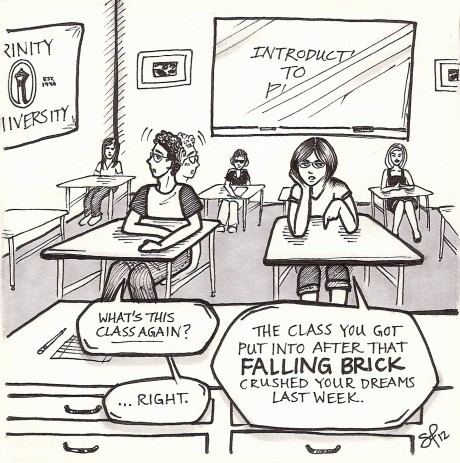
The Student Conduct Summary Report is nothing new. In fact, its release happens every year, and every year, we at The Trinitonian report on the findings. In years past, alcohol and drug violations have been the focus, but this year those findings were overshadowed by hazing and sexual misconduct cases, which are usually very low.
In all actuality, The Trinitonian, along with probably most of the Trinity community, is looking forward to moving past the events of last spring to what will, we hope, be a constructive year for our community and local Greek system.
That being said, we are obligated as the student-edited press to report the summary results, and while those findings are an issue, we want to raise a bigger question related to all conduct board cases and decisions: Do more lenient verdicts reflect the will of the student body, and if so, does that desire to live without reprimand say something about our values as students?
As stated by both Student Conduct Board co-chairs in this week’s front page story and the Student Conduct Summary Report itself, both boards were “fairly lenient” this year. Many Trinity students have gone before the conduct board or know someone who has, including our staff. In fact, many of us are living proof that it’s relatively easy to talk your way out of an offense even when you were clearly “responsible.”
In a perfect, just world, we should each be held accountable, yet we are slow to call for harsher sentences, arguing that a more forgiving system offers a chance to learn from past mistakes, and, at an institution of higher education, we’re all about learning.
However, this educational approach is coupled with the fact that because we are privileged enough to attend a private university, we are, in many ways, sheltered from the realities of the outside world. At large, publically funded universities, it’s not uncommon for students to be issued a Minor in Possession citation by their campus police force. Here at TU, the worst that can happen is you endure a somewhat-embarrassing “trial” and pay a $50 fine.
But does sheltering us from public adjudication make us less informed and more naà¯ve, and thus hinder us when we do enter into the real world and have to face real consequences with real implications to our criminal records? Or are we happy being college students with a free pass? That’s a question for all of us, to be answered on the personal level.
One thing is for sure though: the Student Conduct Summary Report is only the jumping off point for what will be a series of questions this year pertaining to our set of beliefs as students, as organizations and as a university. The university will unveil its strategic plan next week, giving the community an idea of what’s to come. The four Greek organizations currently on probation will soon undergo an extensive review process and the new Student Conduct Board protocols, outlined by the co-chairs, will affect the way cases are observed on campus.
So, this is, without a doubt, a time to ask ourselves the hard questions about where we stand on certain issues and to decide what’s best for the community in the long run. If we can see past our egocentric desires and collegiate whims to really consider the public good, we may have learned the ultimate lesson in civic responsibility.






Tommie Ethington • Sep 6, 2012 at 1:52 pm
Couldn’t have done it without your reporting!
Faith Ozer • Sep 3, 2012 at 11:20 am
Love it!